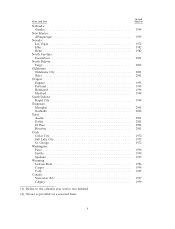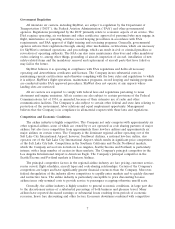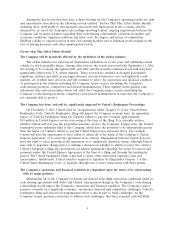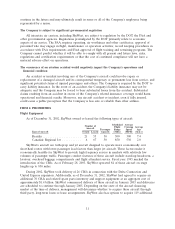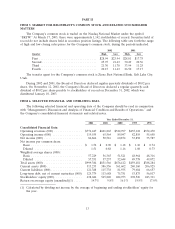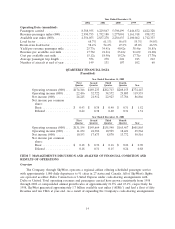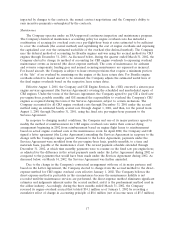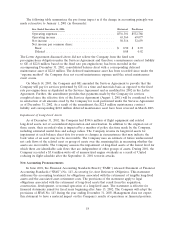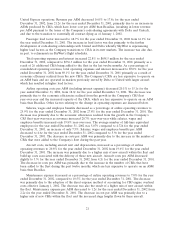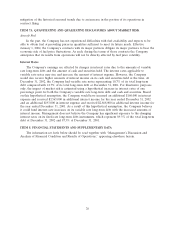SkyWest Airlines 2002 Annual Report Download - page 20
Download and view the complete annual report
Please find page 20 of the 2002 SkyWest Airlines annual report below. You can navigate through the pages in the report by either clicking on the pages listed below, or by using the keyword search tool below to find specific information within the annual report.Management believes these developments will impact the Company’s operations and financial
performance. In particular, the Company anticipates that its financial performance, including its
margins, will be less predictable than in prior periods and will be negatively impacted as the industry
under goes significant restructuring.
Significant Accounting Policies
The Company’s significant accounting policies are described in Note 1 to the Company’s
Consolidated Financial Statements contained herein. Critical accounting policies are those policies that
are most important to the preparation of the Company’s consolidated financial statements and require
management’s subjective and complex judgments due to the need to make estimates about the effect of
matters that are inherently uncertain. The Company’s critical accounting policies relate to revenue
recognition, aircraft maintenance, and impairment of long-lived assets as discussed below. The
application of these accounting policies involves the exercise of judgment and the use of assumptions as
to future uncertainties and, as a result, actual results could differ materially from such estimates.
Revenue Recognition
Passenger and freight revenues are recognized when service is provided. Under the Company’s
contract flying agreements with Delta and United, revenue is considered earned when the flight is
completed. Passenger tickets sold but not used and the liability to other airlines are recorded as air
traffic liability.
In 2000 and 1997, the Company reached separate ten-year agreements with Delta and United,
respectively, to fly routes under contract flying arrangements. The Company is compensated on a
fee-per-departure basis plus incentive payments based on operational performance. The
fee-per-departure and incentive amounts are adjusted on an annual basis based on changes in projected
operating costs. When the negotiations for the fee-per-departure rates are not completed within a
respective period, the Company records revenues based on the prior period’s approved rates and
assumptions to reflect changes in the Company’s operating structure that management believes are
reasonable. The agreements with Delta and United contain certain provisions pursuant to which the
parties could terminate the agreement, subject to certain rights of the other party, if certain
performance criteria are not maintained. As of December 31, 2002, the Company and Delta had
established rates to be in effect for the Company’s Delta Connection flights throughout 2002.
On December 9, 2002, United filed for reorganization under Chapter 11 of the United States
Bankruptcy Code. Due to the bankruptcy filing, the Company and United began to operate under a
temporary departure rate model while the 2003 rates are being finalized and a new long-term operating
agreement is affirmed within the bankruptcy process. The Company estimates that as of the date of
United’s bankruptcy filing, it was owed approximately $14.0 million for United Express services
rendered prior to the filing. It is the Company’s understanding that United has received approval from
the U.S. Bankruptcy Court authorizing, but not requiring, United to honor pre-petition obligations to
its United Express carriers. The Company believes that if these pre-petition amounts are not paid by
United, the Company may offset amounts owed to United for pre-petition services totaling
approximately $3.6 million. Approximately $9.7 million of the $14.0 million claim resulting from
United’s failure to pay the scheduled weekly wire transfer on December 6, 2003. As a result of United’s
financial position and related contingencies, the Company did not recognize the $9.7 million as revenue
due to the uncertainty of collection. Additionally, as of December 31, 2002, the Company established a
reserve against the remaining prepetition receivables from United.
Management believes that substantially all of the Company’s ongoing revenues will be generated
pursuant to the contract flying arrangements with Delta and United. The Company’s revenues could be
16


